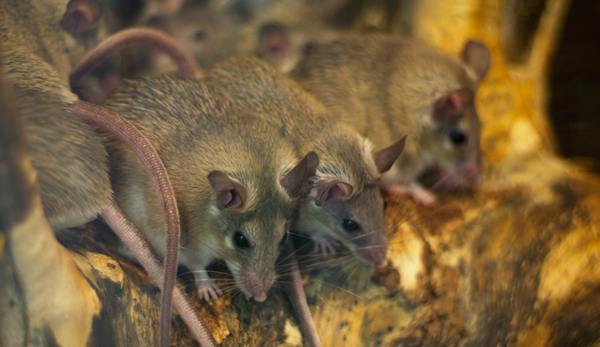Mouse Control
By Chris Williams on January 27, 2014.

John Maher: Hi. My name’s John Maher. Today, I’m here with Tim Chace, an entomologist and and pest control technician at Colonial Pest, a pest control company serving eastern Massachusetts and southern New Hampshire and Maine. Today, we’re talking about mouse control. Welcome, Tim.
Tim Chace: Thanks, John.
John: Tim, do mice make noises in the wall?
Tim: Mice do make noises in the wall. The chief noise that we hear with mice is a very light tapping sound, where the mouse holds the acorn against the joists and the sheetrock and taps that with his teeth. It’s like a little hammering noise that you hear in the wall.
Another noise that can be associated with mice is when they drop their acorns. You can hear a very light dropping and rolling sound as they move this acorn around in the ceiling. That can be an indication of mice.
John: If it’s more of a loud, scratching sound, probably something else, like squirrels.
Tim: The squirrels make a sound that’s been described as like something running through the walls. It’s definitely a little bit louder sound, it’s more of a flopping thing, very consistent, moving from Point A to Point B.
Mice also move within the structure in sort of a pattern from their entry point to where they live inside the house. So that route can be something that you might notice on a consistent basis, a little noise over the ceiling and then some tapping.
John: And do mice carry any germs or diseases that could affect my health that I need to be concerned about?
Tim: Certainly. Mice move in unsavory environments. They are moving around places that you don’t want to be involving your food and stuff with that. They’ve been associated with over nine different diseases including salmonella, the bubonic plague, the LCM virus, rat bite fever and tapeworms. So it’s not something you want running around your counter or your silverware drawer.
John: And what’s the life‑cycle of mice?
Tim: Mice have very fast life‑cycle.
If conditions are right, the females can have 6‑10 litters a year, usually producing between five to eight young mice per litter. Females can live up to 15 months and males can live somewhat longer, some up to four to six years.
If everything is considered they have a tremendous breeding capacity. So if conditions are right a population of mice can build up fairly, fairly fast.
John: And are there particular times of the year when mice are found in homes?
Tim: Mice want to enter your house to escape from predators at all times a year but we potentially see a spike in mouse activity in the fall as mice try to escape the colder temperatures and get into a place where it’s a little bit warmer, where they can spend some time.
John: And then what is the process for coming into a home and you find mice litter there, what’s the process for controlling those and removing those mice?
Tim: At Colonial Pest Control we focus on two things. Number one would be reducing the rodent population that lives within the structure that typically involves the use of rodenticides which knock down the population within about a week.
And then we also incorporate exclusion with that where we try to find out the places where mice are entering the house and seal those locations up so that the population within the house dies and then we prevent other mice from entering the structure at that point, and we are having great success with that process.
John: Great. Well Tim thanks very much for speaking with me.
Tim: You are welcome John.
John: And for more information you can visit the website at colonialpest.com or call 1‑800‑525‑8084 for a free quote.